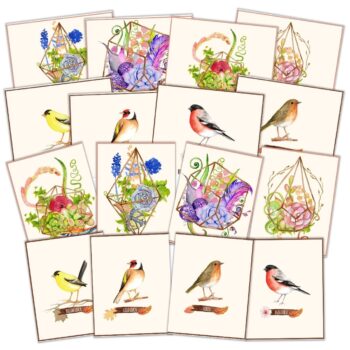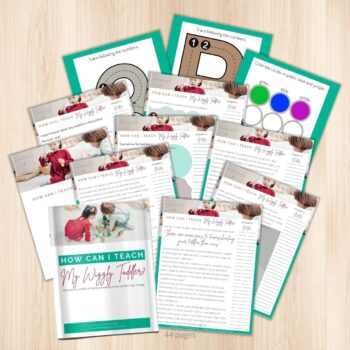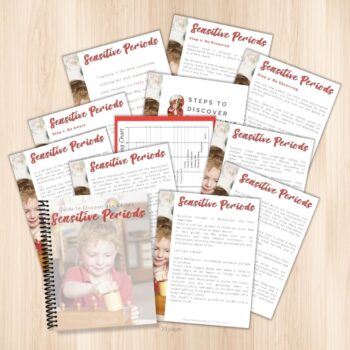When you are looking at raising your baby the Montessori way, the first thing you need to focus on is the baby’s developmental stages during the first year of life. It’s an extremely important time that shouldn’t be neglected in a rush that it will pass by quickly.
The first year of a child’s life is a period of rapid growth and development, with each stage presenting unique opportunities for cognitive, physical, and emotional progress. In the initial three months, infants are highly receptive to their environment, as their main focus is on adapting to their surroundings and developing basic motor functions.
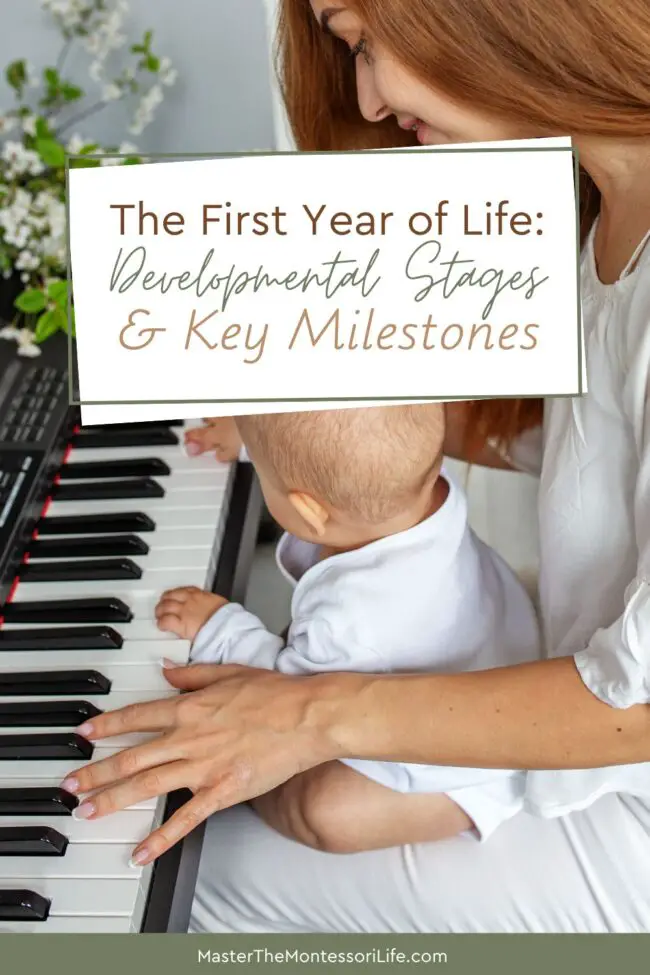
Infant Development: Months 0-6
During this period, sensory engagement through various textures, sounds, and visual stimuli aids in their early development, while activities such as tummy time help strengthen neck and shoulder muscles. Keeping infants’ movements unrestricted with minimal clothing and safe play areas encourages more natural exploration.
As they transition into the 3-6 month range, babies become increasingly curious and physically capable. This makes a crucial time for sensory and motor skill enhancement. Providing lightweight objects of differing shapes and textures can stimulate their reaching and grasping abilities.
For motor development, allowing ample space for rolling over is beneficial. Visual tracking can be nurtured using toys or mobiles. Musical instruments like rattles or bells introduce them to sound exploration, fostering their auditory skills.
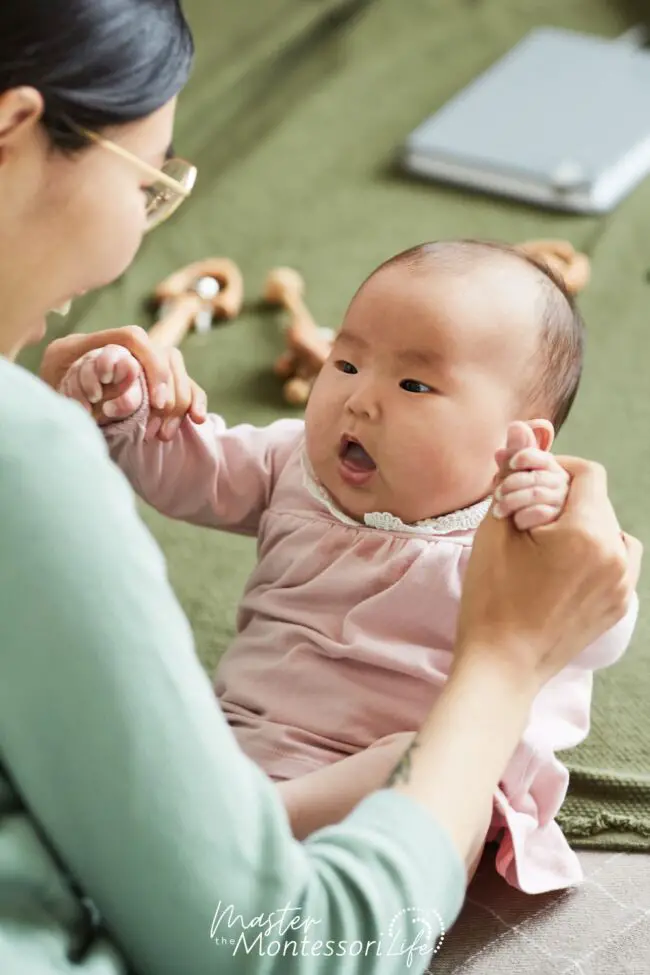
Baby Development: Months 6-12
From six to nine months, babies start to explore their environment more actively as their mobility improves. This is a period of significant physical and cognitive advancement. Encouraging crawling within safe, open spaces supports their physical growth, while playing games like peek-a-boo aids in understanding object permanence.
Approaching their first birthday, babies strive for even greater independence and confidence in their abilities. By this stage, support for standing and cruising along furniture becomes essential.Toys that demonstrate cause-and-effect relationships can enhance logical thinking.
Encouraging frequent babbling and simple word formation aids in language development. Age-appropriate practical life activities, such as cleaning up toys or participating in simple family routines, contribute to their growing sense of autonomy and participation in their immediate environment.
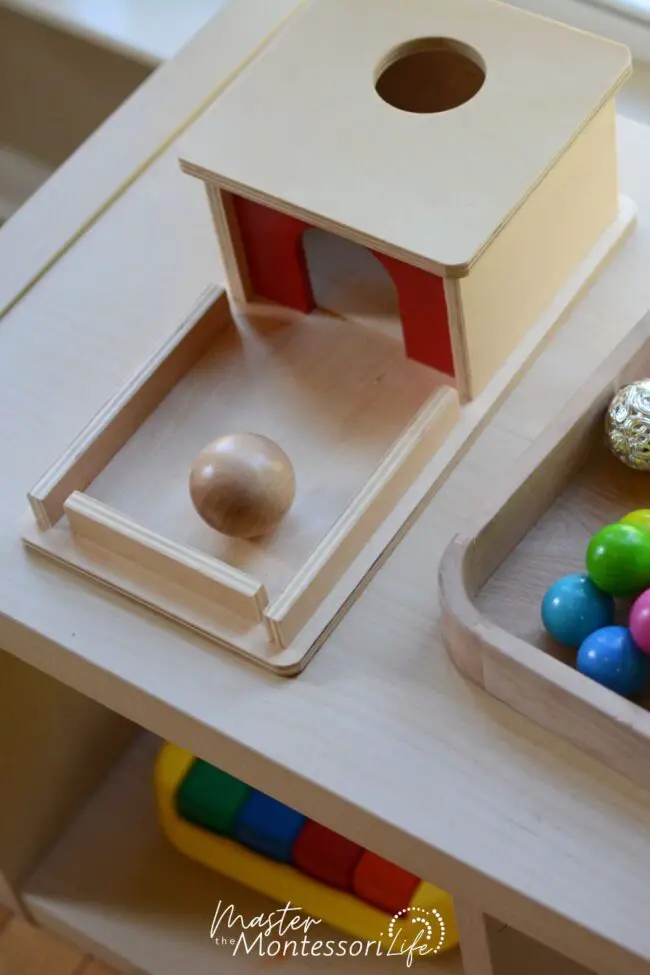
Raise your Baby the Montessori Way
Throughout this period, creating a nurturing, stimulating, and safe environment tailored to each stage of development lays the groundwork for a child’s future growth and fosters a lifelong love of learning.
You might also enjoy these relevant topics:
- Montessori from Birth: Why Start from Day One
- 10 Essential Montessori Toys for Your Baby’s First Year
- The First Year of Life: Developmental Stages and Key Milestones
- How to Start doing Montessori with your Baby
- A Comprehensive Montessori Guide for New Parents
- Strategies for Fostering Independence in Babies
Montessori Wooden Baby Toy Set – 6 Pieces of Rattles, Push Car and Newborn Toys for PgUp Baby Play Gym Wooden Baby Gym with 7 Toys, Foldable Wooden Play Gym Frame Hanging
PgUp Baby Play Gym Wooden Baby Gym with 7 Toys, Foldable Wooden Play Gym Frame Hanging hahaland High Contrast Baby Flashcards – Black and White Infant Baby Cards 0-6 Months Tummy Time
hahaland High Contrast Baby Flashcards – Black and White Infant Baby Cards 0-6 Months Tummy Time MORITECK Spinning Drum, Montessori Toys for Babies 6-12 Months, Infant Kids Developmental Wooden Toy for Boy
MORITECK Spinning Drum, Montessori Toys for Babies 6-12 Months, Infant Kids Developmental Wooden Toy for Boy Montessori Play Kit for 0-6 Month Baby Tummy Time Interactive Toys Baby Brain Development Toys Rattle
Montessori Play Kit for 0-6 Month Baby Tummy Time Interactive Toys Baby Brain Development Toys Rattle Montessori Babies
Montessori Babies
- Introduce Hibernation, Migration and Adaptation to Children
 When you introduce your children to the concepts of hibernation, migration and adaptation, you will love to learn how they find food, which ones follow each of these survival techniques and so much more.
When you introduce your children to the concepts of hibernation, migration and adaptation, you will love to learn how they find food, which ones follow each of these survival techniques and so much more. - Montessori Farm Sensory Bin: Hands-On Learning
 A Montessori farm sensory bin is simple to assemble, rooted in purposeful work, and designed to invite deep exploration.
A Montessori farm sensory bin is simple to assemble, rooted in purposeful work, and designed to invite deep exploration. - Tips to incorporate Fall into your Montessori environment
 Come and find out how you can highlight and celebrate Fall in your Montessori environment without stressing out about it.
Come and find out how you can highlight and celebrate Fall in your Montessori environment without stressing out about it. - Hands-On Fun: 3 Montessori Practical Life Activities for Fall
 These simple Montessori Practical Life activities for Fall are easy to do anytime you have the materials ready.
These simple Montessori Practical Life activities for Fall are easy to do anytime you have the materials ready. - Embracing Autumn: A Montessori Guide to Fall Fun
 Spread the loveThe arrival of autumn brings a special kind of magic. The air turns crisp and leaves paint the…
Spread the loveThe arrival of autumn brings a special kind of magic. The air turns crisp and leaves paint the… - Montessori Toddler Essentials
 The Montessori method offers a pathway with a series of Montessori toddler essentials that you will find helpful.
The Montessori method offers a pathway with a series of Montessori toddler essentials that you will find helpful.



